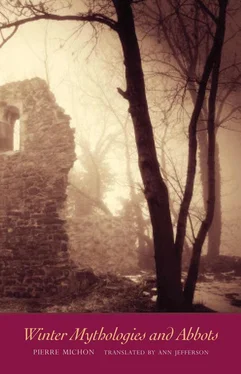Hugues’s voice is strong and young, crushed and burning. He reads, “And God said, Let the waters under the heaven be gathered together unto one place, and let the dry land appear: and it was so. And God called the dry land Earth; and the gathering together of the waters called He Seas: and God saw that it was good. And the evening and the morning were the third day.” Hugues trembles slightly. Èble stretches an arm toward the window which gives onto the mouth of the river, and he says, “We have reached the Second Day. The earth and the waters are not disentangled. We shall make the Chaos and the Void which lie beneath into something on which we can set foot. Saint George must be able to ride his horse across it and cows graze upon it. In a year from now I want to plant my crozier on it and have it stand firm without being swallowed up by the great maws below.” The gulls are heard again. Then the psalms are sung.

The next day before dawn they take the two barges that belong to the abbey, launch them on the trickle of water, and set off in search of the arms that will separate the Chaos from the Void. Abbot Èble is part of the expedition, and Hugues is there too. Each of them is sitting in a barge, two acolytes with poles in each stern. They know a little about the arms they’re going in search of, as these are the ones that fish for themselves and for the monks, and live on the little islands nearby, Grues, La Dive, La Dune, Champagné, Elle, Triaize. From one barge to the other in the backwater, they joke about these natives who stink of fish. They say that they worship rain like a wandering idol. They say that they piously coat the crosses which are planted for them with honey, and make them offerings of bird carcasses and flat stones. They grant that they are tall and often handsome, with arms of iron, for the miasmas from the marshes carry off so many in their early years that those who survive are made of iron. They grant that they are gentle. The monks visit them from time to time and talk of salvation, the natives listen obligingly but barely understand the language. However, they understand perfectly when the monks say to them: so many barrels of herring to the monastery for Christmas, so many thornback skate and carp for Easter, so many sardines for the monks’ everyday fare. It’s because they’re half fish, says Hugues. But we still christened them, says Èble. They laugh, and the huge pale sky above the two tiny black monks laughs too, along with the gulls.
They disembark at Grues, at La Dive, at Triaize. There are huts with drying fish, one or two ambling cows. They gather the fishermen or their womenfolk, whatever is to be had: faces that are sharp or heavy, crushed or burning, assorted bodies dressed in tunics which look very like the monks’ cowls, except that they are not necessarily black. The monks make the sign of salvation over them and they all sit down. The monks tell them that they are going to drain the marsh at the foot of Saint-Michel, transform mud into rock, work a miracle. Ever since the monks spoke to them of miracles, they have retained the word, and they listen more attentively. The miracle requires their arms. The monks tell them that this miracle land and the cattle it will bear are to be shared, half for them and half for the monks. The monks say to them that those who are enticed by this prospect should follow them at once, and set up their shacks in the meadow by the monastery for several months each year over the summer — and that they will be able to return to their homes from October to mid-May, when the marsh reverts to being forthright sea and honest river. It is Hugues who does the explaining in his beautiful, burning voice, and Èble adds that besides the extra land and the cattle they will have salvation. The natives talk for a long time among themselves; some go back to their nets, but others don’t. On Dive two couples with their children launch a barge and follow the monks; on Grues a silent old man and two young men; on Triaize no one. They land on Champagné.
It’s the middle of the day. They are hungry.
Six black monks climb the steps of the harbor on Champagné, and they are now in the middle of a ring of huts. On Champagné the men are hungry, too; they have all returned from fishing and raised the nets and the creels; fish is cooking on the huge fires. The explanations, the hires, and salvation can wait until later: six black monks sit scattered among the fishermen, talking of sturgeon, pike, and the summer months. They laugh; the steaming bowls are filled. Èble has not engaged in talk and is sitting alone; he is tired, irritated with himself; he is wondering what possessed him yesterday to tangle with water-courses — what pride, what diabolical imposture. Someone hands him a bowl; he looks up. Above him a very young and beautiful, very serious woman is holding it out to him with an open hand. She has a strong nose and lips, wide open eyes. She is tall and her skin is white. Her bare feet are like marble. Èble blazes in an instant.
Èble is indeed the brother of Towhead, and it’s time to say so. He too can burn. It’s true that his fire doesn’t take the form of a shimmering hulk that gallops about with halberd, broigne, assorted ironware, and a lance at its tip; his fire is more subtle, less noisy — his two fires, that is. For he has retained the two passions which come from the fire and which smolder assiduously beneath the black hood in the hut at Saint-Michel, as they smoldered beneath the gold miter at Saint-Martial in Limoges, amid the fumes from the incense: his two flaming torch brands, glory and female flesh. Glory, which is the gift of spreading fire within the memory of men, and flesh, which has the gift of consuming bodies at will in a spike of flame or a bolt of lightning. And the tall woman who is standing in front of him, and who is already walking away on her feet of marble, has the unbound vertical force of a lightning flash.
Night is falling; the huge twilight sky is red. After Champagné, the six men in black set up their bait of cattle and salvation on Chaillé, Île-d’Elle, La Dune, Le Gué, and they land a good catch. More than thirty barges are following them, laden with many arms, men, women, children, and a few gray cows. In one of these barges there is the woman from Champagné, with her husband the fisherman. Èble looks at her, and he sees that Hugues is looking at her. She is looking at the water.

May is drawing to a close.
In the library they have the books that speak of the land and the sea, like the two verses from the Third Day but with less solemnity: those by the captains who always need to drain a little water for twenty legions to keep their feet dry as they pass with catapults and horses (Caesar and Constantius); those by the historians who recount how the towheaded tyrants set about putting a mountain in the place of a lake, a torrent in the place of a mountain (Cassius Dio and Tacitus); those by the dabblers and the agronomists (Pliny, those who wrote to him, and those who refuted him); and Augustine, who proves that matter and miracles are joined like mortise and tenon. They all pore over these books, argue fiercely, make plans, decide on the equipment needed, and share out the tasks. Èble does not take part and is bored. He thinks fondly about the ragings of his brother, who is fully armed and already in the saddle, setting off at a gallop, and whom he couldn’t restrain. He can’t restrain himself, either. He opens the door of the library. It’s a morning of fine May drizzle. He pulls his hood down over his head. He is now in the meadow where the gentle savages who believe in cattle and salvation have set up home. They have built huts out of the beeches that grow here and, under the direction of the lay brothers, a forge and a carpentry shop. The gray cows wander here and there beneath the drizzle; the black abbot with his hood goes straight to a hut he knows. She is squatting on her feet of marble. She’s alone; her husband is at the forge. He throws back his hood; she sees the towhead. She bares herself up to the waist, she lies down, she opens. He looks at the wound of wet fire in her tuft of tow, then sees it no longer because he has plunged into the fire. She cries out like a seagull, the bolt of blue lightning unites them; beneath his hood Èble returns to the library. He passes Hugues, who is walking toward the huts beneath his hood.
Читать дальше












